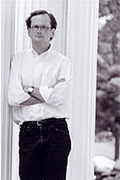 CNET’s Caroline McCarthy has posted a summary of one of Lawrence Lessig’s speeches associated with his Change Congress initiative.
CNET’s Caroline McCarthy has posted a summary of one of Lawrence Lessig’s speeches associated with his Change Congress initiative.
“Even though today the individuals [in Congress] are better than the individuals who populated our government in the past, the problem of this corruption is much worse,” Lessig explained. “And it’s much worse because government today is much more significant. It’s first more critical to core national problems...and second, it’s more pervasive. The government’s fingers are everywhere.”
...
But the other big difference between the 19th century’s politics and today’s is what’s making possible Lessig’s mission at Change Congress: Daniel Webster’s America didn't have Wikipedia, WordPress, or Twitter. (It would’ve been kind of cool, though: “Wig shopping with @henryclay, then out to eat. WTF is with these tea prices?”) The Web’s tools have made it possible for far more information to make it into the hands of ordinary citizens, and those citizens in turn can use the Web to band together and work toward democratic action.
The post made me think of George Lakoff’s new book The Political Mind. According to Amazon, the book seems to be a rhetorical look at politics over the last decade or so, focusing on the ways in which pure rationality has failed progressives. I bought a copy yesterday, and I’m excited about reading it.
No comments:
Post a Comment